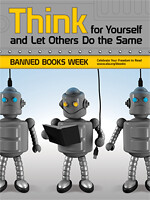Tom Perotta
My cousin, DeAne, who teaches at St Olaf and writes interesting things
here, suggested that I read
The Leftovers. I guess I should assure you right away that this is not a book about the contents of someone's refrigerator on the day after Thanksgiving. You must be thinking of a John McPhee book.
Something has gone wrong with the Rapture. One day, shortly before the story begins, people all over the world, some small but significant part of the population, simply disappeared. The problem is that it appears that this was a random sampling of humanity. Christians, Jews, Muslims, Hindus, Atheists, posibly even a few Unitarians, all were among those that departed. They were not all pillars of the community, some were philandering husbands, others were small children. Nothing makes sense.
One character in the novel, a former minister, who believe he should have been first in line for the Rapture, publishes a scurrilous newsletter, exposing the sins and the foibles of those who went. He is trying to prove that the departure was not, in fact, the Rapture.
Several cults have arisen, members of one, The Watchers, follow people around, wearing all white, not speaking, and try to remind their victims, as if they could forget, that they have been left behind. Another paint bulls-eyes on their foreheads and party like there is no tomorrow.
I am not surprised by Perrotta's inexplicable rapture event. I was taught that we mortals should not expect to understand God's plan. If there were to be a Rapture I would expect it to be inexplicable. This, to me, is just another way to say it would indeed be random. One can not explain the reason for a random event.
The people in
The Leftovers are like the survivors of a disaster. Everyone has lost friends and family members in a single world wide event. One one level is a very naturalistic book about the way we deal with grief. Most of the characters in the book are residents of the fictional town of Mapleton and they carry on with their daily lives despite the unexplained disappearance of many of their fellow townspeople.
The rise of these various cults is a second theme in the book, again, excluding the root cause of their rise, it is a realistic seeming look at how cults arise. "Holy Wayne" is a man who tries to help people by offering to take their pain, by giving them hugs. He gives only momentary relief to any individual, yet a cult of personality forms around him until, like Bhagwan Shree Rajneesh. He finds himself living in a compound in Idaho with armed security patrolling the property and a harem of underage "spiritual wives."Incidentally, I'm sure that Tom Perrotta didn't realize that he gave "Holy Wayne" the same name as the former Congressman from the first district of Maryland, the honorable Wayne Gilchrest.
I won' give away the ending - it is either a surprise which brings all of the themes together in a sudden and satisfying way (my view) or a cute but cynical cop out. See for yourself. Just don't read the last page first.













